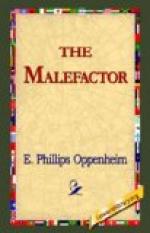“Quite a comedy, isn’t it?” he remarked grimly.
“It doesn’t present itself in that light to me,” Aynesworth answered.
Wingrave blew the smoke away from in front of his face. “Ah!” he said, “I forgot that you were a sentimentalist. I look upon these things from my own point of view. From yours, I suppose I must seem a very disagreeable person. I admit frankly that the sufferings of other people do not affect me in the slightest.”
“I am sorry for you,” Aynesworth said shortly. “If there is going to be much of this sort of thing, though, I must ask you to relieve me of my post. I can’t stand it.”
“Whenever you like, my dear fellow,” Wingrave answered. “I think that you would be very foolish to leave me, though. I must be a most interesting study.”
“You are—what the devil made you!” Aynesworth muttered.
Wingrave laid down his cigarette.
“I am what my fellows have made me,” he said slowly. “I tasted hell for a good many years. It has left me, I suppose, with a depraved taste. Ring up my brokers, Aynesworth! I want to speak to Malcolmson. He had better come round here.”
The day dragged on. Aynesworth hated it all, and was weary long before it was half over. Everyone who came was angry, and a good many came whom Wingrave refused to see. Just before five o’clock, young Nesbitt entered the room unannounced. Aynesworth started towards him with a little exclamation. The young man’s evident excitement terrified him, and he feared a tragedy. Malcolmson, too, half rose to his feet. Wingrave alone remained unmoved.
Nesbitt walked straight up to the table at which Malcolmson and Wingrave were sitting. He halted in front of the latter.
“Mr. Wingrave,” he said, “you will give me my receipt for those shares for fifty-seven thousand six hundred dollars.”
Wingrave turned to a paper by his side, and ran his forefinger down the list of names.
“Mr. Nesbitt,” he said. “Yes! sixty thousand dollars.”
The young man laid a slip of paper upon the table.
“That is a certified check for the amount,” he said. “Mr. Malcolmson, please give me my receipt.”
“Ah!” Mr. Wingrave remarked. “I thought that you would find the money.”
Nesbitt bit his lip, but he said nothing till he had the receipt and had fastened it up in his pocket. Then he turned suddenly round upon Wingrave.
“Look here!” he said. “You’ve got your money. I don’t owe you a cent. Now I’m going to tell you what I think of you.”
Wingrave rose slowly to his feet. He was as tall as the boy, long, lean, and hard. His face expressed neither anger nor excitement, but there was a slight, dangerous glitter in his deep-set eyes.
“If you mean,” he said, “that you are going to be impertinent, I would recommend you to change your mind.”
Nesbitt for a moment hesitated. There was something ominous in the cool courage of the older man. And before he could collect himself, Wingrave continued:—




